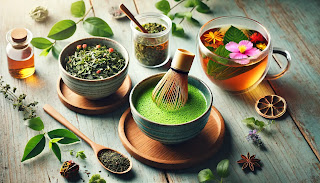Matcha vs. Green Tea vs. Herbal Tea: What’s the Difference?
Confused about the difference between matcha, green tea, and herbal tea? Discover how they vary in taste, health benefits, caffeine content, and preparation in this complete, easy-to-read guide.
One Word, Many Meanings
☕ The word "tea" gets thrown around a lot. But not all teas are created equal — and not all are even real tea! From the vibrant green of matcha to the calming warmth of herbal blends, each one tells a different story.
If you've ever wondered about the difference between matcha, green tea, and herbal tea, you're in the right place. Let’s break it down — simply, clearly, and with love.
1. What Is Matcha?
Origin & Making Process
- Comes from Japan (especially Uji and Nishio)
- Made from shade-grown tea leaves called tencha
- Leaves are stone-ground into a fine green powder
- Unlike other teas, you consume the entire leaf
Taste Profile
- Rich, creamy, earthy
- Slightly bitter with a hint of natural sweetness
- Has a signature umami flavor
Caffeine Content
- High caffeine: ~60–70 mg per serving
- More energizing than regular green tea
Health Benefits
✅ Powerful antioxidant boost (especially EGCG)
✅ Supports metabolism and fat burning
✅ Promotes focus and calm alertness (thanks to L-theanine)
✅ Detoxifying and immune-strengthening
✅ Great for sustained energy without the crash
2. What Is Green Tea?
Origin & Making Process
- Comes from China, Japan, and other Asian countries
- Made from the same plant as black tea (Camellia sinensis)
- Leaves are quickly steamed or pan-fired to prevent oxidation
- Brewed by steeping the leaves in hot water
Taste Profile
- Light, grassy, fresh
- Can be slightly astringent
- Japanese varieties like sencha taste more vegetal; Chinese ones like longjing are milder
Caffeine Content
- Moderate caffeine: ~20–40 mg per cup
- Less than matcha, more than most herbal teas
Health Benefits
✅ Rich in catechins and antioxidants
✅ Supports fat burning and heart health
✅ Improves brain function and alertness
✅ May lower risk of certain diseases
✅ Anti-inflammatory and immune-boosting
3. What Is Herbal Tea?
Origin & Ingredients
- Not made from tea leaves
- Crafted from herbs, flowers, roots, fruits, seeds
- Technically a tisane, but often called tea
Popular Types
- Peppermint – soothes digestion
- Chamomile – promotes sleep and relaxation
- Ginger – supports immunity and reduces inflammation
- Hibiscus – helps lower blood pressure
- Lemon balm, rose, rooibos, lavender — each with unique properties
Taste Profile
- Extremely diverse: floral, spicy, fruity, earthy
- Naturally caffeine-free
- Perfect for both hot and iced tea lovers
Caffeine Content
- Caffeine-free (unless blended with actual tea)
- Ideal for evenings or caffeine-sensitive individuals
Health Benefits
✅ Calming and relaxing
✅ May support digestion, sleep, and mood
✅ Can help with inflammation and detoxification
✅ Each herb has its own special benefit
4. Key Differences at a Glance
Here’s what sets them apart:
- Matcha gives you the entire tea leaf in powdered form — meaning more nutrients and caffeine
- Green Tea is steeped and lighter in caffeine, perfect for daily sipping
- Herbal Tea isn’t actually tea and contains no caffeine — it's all about herbs and their natural healing powers
5. Which One Should You Choose?
The answer depends on your mood, goals, and taste:
- Want a clean energy boost? → Go for matcha
- Looking for a refreshing daily health habit? → Try green tea
- Need to wind down or soothe your tummy? → Herbal tea is your friend
Better yet, include all three in your routine! Each has something unique to offer your body and mind.
Conclusion: A Cup for Every Moment
There’s no "best" tea — only the best tea for you.
Matcha energizes. Green tea balances. Herbal tea heals.
Explore them all. Sip with intention. Let your cup nourish your body and calm your soul.
FAQ – Frequently Asked Questions
1. Can I drink matcha every day?
Yes! One to two servings a day is considered safe and beneficial. Just be mindful of the caffeine.
2. What’s the best tea for sleep?
Herbal teas like chamomile, lemon balm, and lavender are perfect for bedtime.
3. Is green tea okay on an empty stomach?
Some people may experience nausea or stomach irritation. It’s best consumed after a light meal.
4. Does herbal tea have side effects?
Some herbs may interact with medications or cause allergies. Always check labels or consult your doctor if unsure.
5. Can I mix different teas together?
Absolutely! Green tea with mint, or chamomile with lavender — blending can be both delicious and beneficial.



Comments
Post a Comment